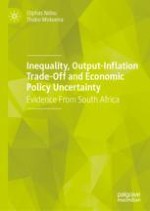2019 | OriginalPaper | Chapter
5. Do Monetary Policy Shocks Influence Income Inequality Dynamics in South Africa?
Authors : Eliphas Ndou, Thabo Mokoena
Published in: Inequality, Output-Inflation Trade-Off and Economic Policy Uncertainty
Publisher: Springer International Publishing
Activate our intelligent search to find suitable subject content or patents.
Select sections of text to find matching patents with Artificial Intelligence. powered by
Select sections of text to find additional relevant content using AI-assisted search. powered by
